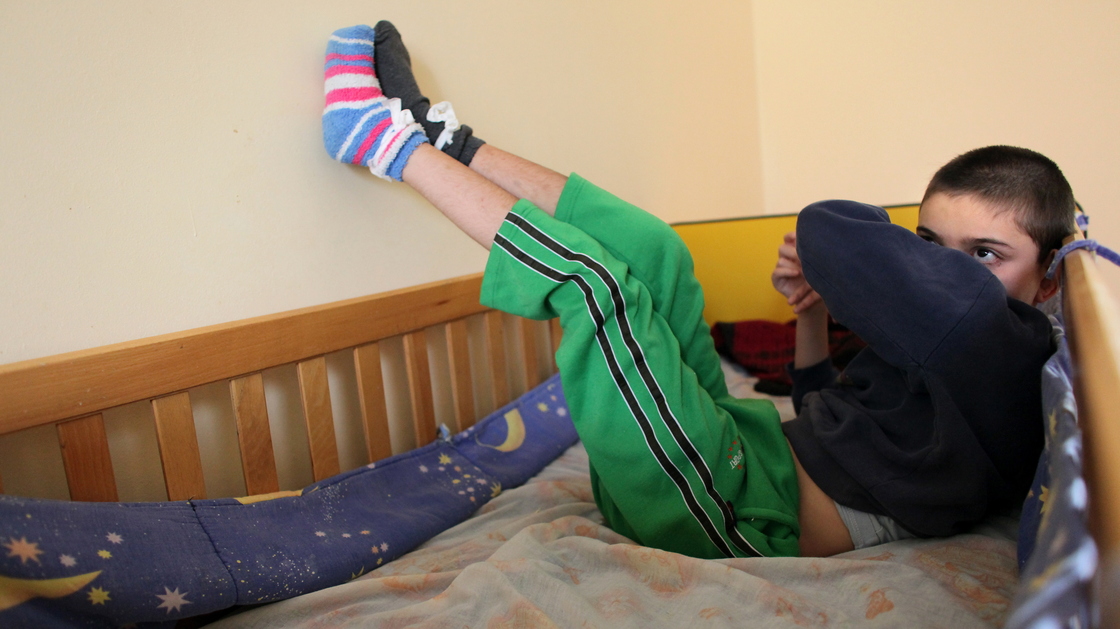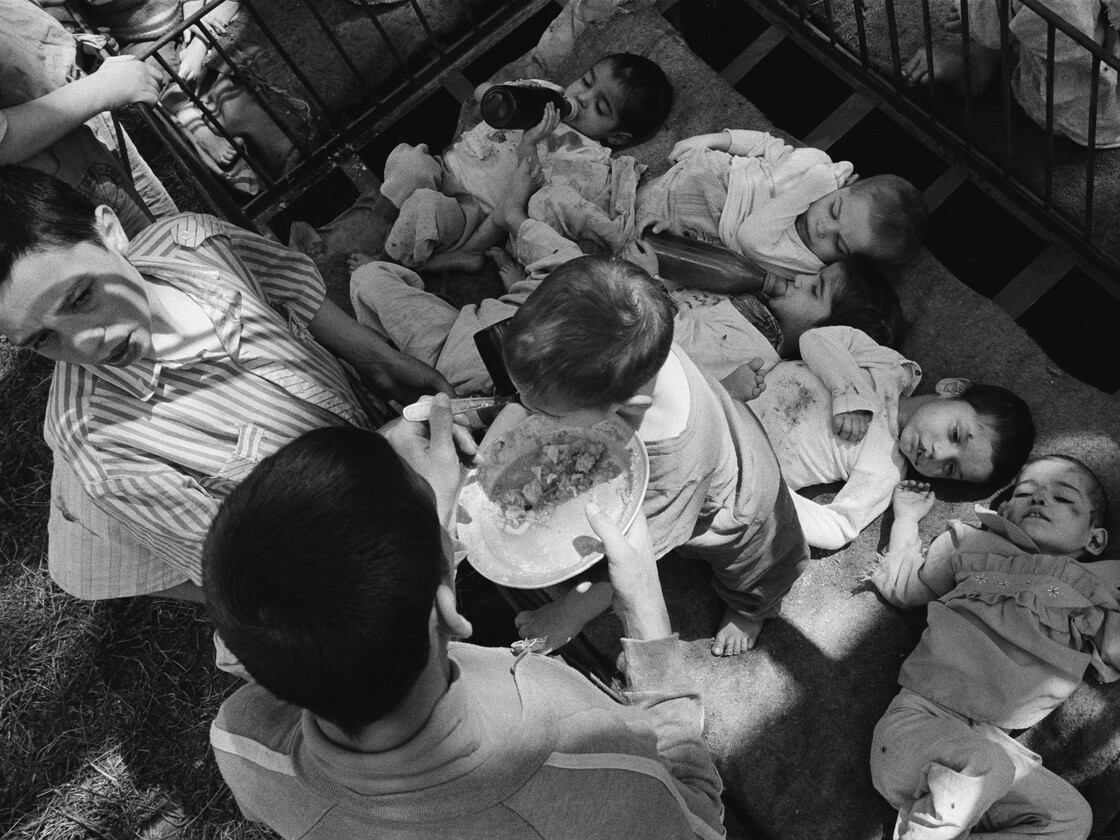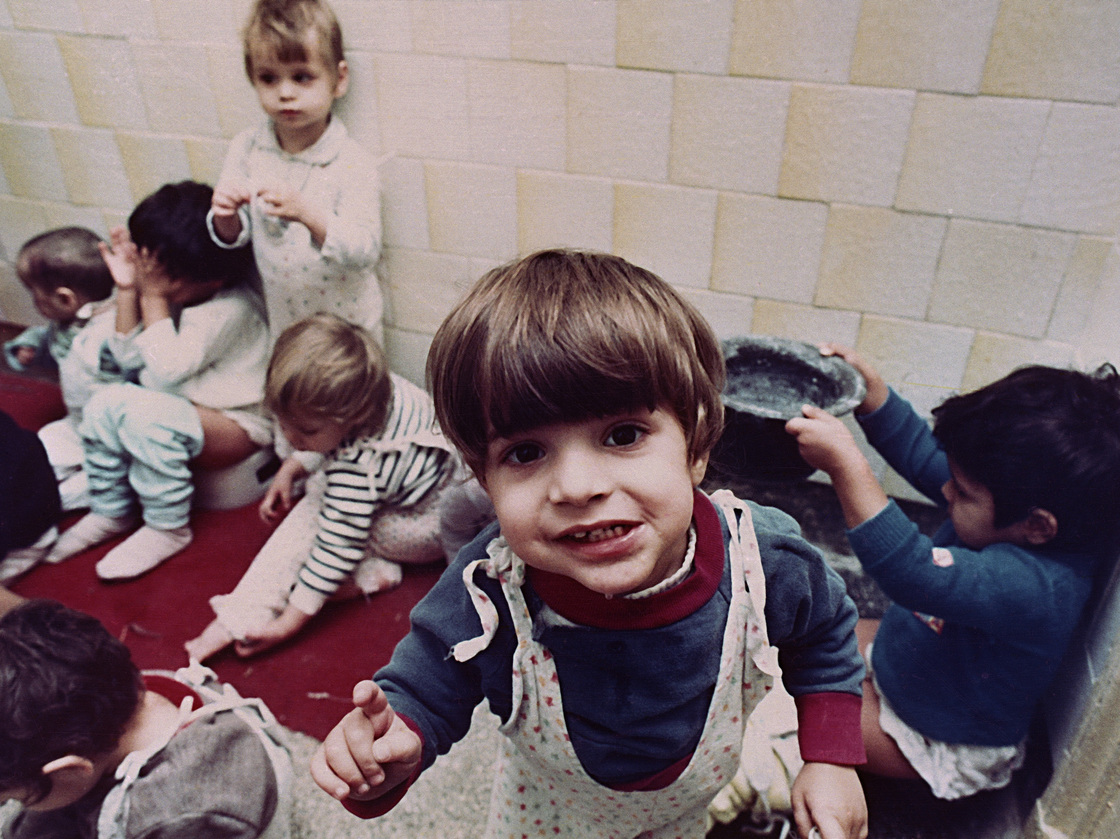hide captionA disabled and orphaned Romanian child in his bed at the Targu Jiu orphanage in southwestern Romania in 2009. Romania has, in general, improved conditions in orphanages that provoked outrage when they were exposed internationally nearly a quarter-century ago. However, some 70,000 kids are still in the care of the state.
Thomas Coex/AFP/Getty Images
A disabled and orphaned Romanian child in his bed at the Targu Jiu orphanage in southwestern Romania in 2009. Romania has, in general, improved conditions in orphanages that provoked outrage when they were exposed internationally nearly a quarter-century ago. However, some 70,000 kids are still in the care of the state.
Thomas Coex/AFP/Getty Images
First of two stories
The 1989 overthrow and execution of Romanian dictator Nicolae Ceausescu provided the first glimpse of a country that had been mostly closed to the outside world — and many of the scenes were appalling.
Among the most disturbing were images of tens of thousands of abandoned children suffering abuse and neglect in Romania's orphanages. Many were confined to cribs, wallowing in their own filth and facing mental health issues.
There was outrage in the West. Foreign charities came in to help. Europeans and Americans adopted thousands of children.
Nearly a quarter-century later, the fate of Romania's abandoned children is an unresolved issue. While the orphanages, in general, have improved, the number of children in state care — more than 70,000 — is nearly the same as it was in 1989. Many in the field say there are tens of thousands more on the streets who are not being counted.
Romania remains a relatively poor country, and the legacy of Ceausescu's policies has not been completely erased.
Complicated Laws
Romania's adoption laws are complex and are seen as one of several reasons there are relatively few adoptions domestically. Annually, between 700 and 900 children are adopted of the 1,200 to 1,400 considered adoptable. Foreign adoptions, which were common during the 1990s, were halted a decade ago.
hide captionUnder Romanian dictator Nicolae Ceaucescu, handicapped and orphaned children were neglected, unbathed and malnourished in orphanages throughout the country. This photo shows orphans at a state institution in Grandinari, Romania in 1989, the year Ceaucescu was overthrown and killed.
Isabel Ellsen/Corbis
Under Romanian dictator Nicolae Ceaucescu, handicapped and orphaned children were neglected, unbathed and malnourished in orphanages throughout the country. This photo shows orphans at a state institution in Grandinari, Romania in 1989, the year Ceaucescu was overthrown and killed.
Isabel Ellsen/Corbis
A revision of Romania's adoption law, which went into effect in April, aims to make more children eligible for adoption and more quickly. But many involved in child protection doubt that the new law alone will significantly improve the lives of these abandoned kids.
Bogdan Panait, head of Romania's Office for Adoptions, says he hopes the new law can bump the number of children considered adoptable to 2,000. But this number would still be less than 3 percent of the children in state care and less than 9 percent of those residing in non-family situations.
"It's not a system for children's rights. It's a system for parents' rights," says Bogdan Simion, executive director of SERA Romania, a nonprofit foundation that is one of the largest financial contributors to Romania's child welfare system.
Consider the case of Tatiana. She spent two years in a baby ward at a Romanian hospital because she had no birth certificate, her caregivers say. But the law states a birth certificate should be issued within 45 days, even if it means listing the mother and father as "unknown."
In Romania, to be considered "adoptable," a child's biological parents must be deceased or indicate that they have no interest in having a relationship with the child. But beyond this, all relatives as distant as siblings of grandparents also must sign away rights to the child. The aim to reintegrate a child into his biological family, for better or worse, is considered the ultimate goal.
Defining Relationships
The biggest change in the new law is a child's eligibility for adoption should be considered after a year without a parental relationship.
But what a "relationship" is, exactly, is unclear. How frequent must contact be to constitute a relationship?
"As often as possible," says Ramona Popa, ROA's cabinet director. "It depends. There are possibilities because sometimes it is very hard for them to come."
hide captionRomanian orphanages were routinely overcrowded and children often lacked toys, as was the case at Bucharest's Number One Orphanage in 1991. A new law should make adoptions a bit easier. However, adoptions remain relatively rare.
Siumui Chan/AP
Romanian orphanages were routinely overcrowded and children often lacked toys, as was the case at Bucharest's Number One Orphanage in 1991. A new law should make adoptions a bit easier. However, adoptions remain relatively rare.
Siumui Chan/AP
Many children now linger in the system because their mothers express interest by stopping by once a year.
Mothers have the option of leaving their newborns at the hospital when they go home. They do not have to give up the rights to the child at this point –- or ever. Some kids are lucky enough to get moved into foster care, which is required prior to adoption eligibility. Others remain at the hospital until they are 2, and are then moved to orphanages.
One foster mother living in Eastern Romania says she considers the two children she fosters her own. But she's unlikely to adopt them. She worries what would happen if she brought the idea up to the children's mother at this point. She's afraid the mother, an alcoholic and victim of domestic violence, would block the adoption and, possibly, take the kids back.
"It's a hard situation because they are not legally adopted," says the foster mother's biological daughter, Cristina. "But they are so much a part of my family. But they are not legally abandoned and they are not adopted either."
For Panait, there are many challenges. Any new approach not only requires the buy-in of a separate-but-intertwined child welfare system – but also relies on changing the minds of a people.
"This is a first step," he says of the revised law. "We are trying, after we are finalizing this first step, to find a solution for all the children. And after we will try all the possibilities. Probably we will have to find other solutions."
Ceausescu's Legacy
Many of the problems today can still be traced back to Ceausescu. When he came to power in the mid-1960s, he aimed to create a race of Romanian worker bees. He instructed all women to have at least five children, and outlawed abortion and birth control.
But many parents couldn't afford to feed and clothe families of seven or more, and children were abandoned in the thousands each year and the state orphanage system grew.
Many thought the state would be able to do a better job of taking care of their kids than they could. And this mentality, especially among the poor, remains today.
Most of those who apply to adopt children are couples who have been unable to have children on their own. Yet few Romanian couples are open to adopting children with disabilities or those of Roma descent.
Meanwhile, studies by the U.S.-funded Bucharest Early Intervention Project and other groups show that mental, physical and emotional issues that result from living in a non-family setting, such as anxiety and attachment disorders, have a much better chance of reversal if the child moves into a family setting before they turn 2.
But within the current structure, it's difficult to get children into the arms of a couple before this small window of opportunity slips away.
Tatiana, the 2-year-old toddler left at a Romanian hospital, was lucky enough to form an attachment to a caregiver who took a special interest in her.
"To get to adoptability you will need a period of 18 months, which is huge. For the child this is huge. For the small child it is huge," Simion says. "It touches the very soul of its brain development. So this has to stop."
Meghan Collins Sullivan is a former supervising editor at NPR. Her reporting in Romania is supported in part by a Rosalynn Carter Fellowship for Mental Health Journalism












